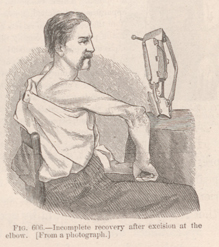Title: Campbell, A. D.
Source text: The Medical and Surgical History of the War of the Rebellion. (1861-65.), Part 2, Volume 2 (Washington, DC: Government Printing Office, 1876), 849.
Civil War Washington ID: med.d2e31328
TEI/XML: med.d2e31328.xml
CASE 1784.—Lieutenant A. D. Campbell, Co. F, 45th Pennsylvania, aged 23 years, was wounded at Petersburg, July 30, 1864, and admitted to the field hospital, 2d division, Ninth Corps. Surgeon J. Harris, 7th Rhode Island, recorded: "Gunshot fracture of elbow joint; resection of elbow joint." The patient was transferred to the Depot Hospital at City Point, and thence, on August 25th, to hospital at Alexandria. Surgeon E. Bentley, U. S. V., reported: "Resection of right elbow joint, removing about two inches of humerus and about two inches of radius and ulna. The operation was performed previous to admission, by an incision four inches in length on the posterior aspect of the arm. Patient furloughed October 19, 1864." Acting Assistant Surgeon J. H. Longenecker reported his admission to the Officers' Hospital, Annapolis, November 30th, and described the injury as follows: "A minié ball entered outer side of joint, passed upward and lodged in the inner side of upper third of arm. The wound of resection is healed. There are several abscesses forming, and the arm is inflamed and painful. Flaxseed poultices and afterward dry dressings were applied. The patient continued to improve. He was discharged from service December 12, 1864." Examiner J. Nichols, of Washington, D. C., certified, December 13, 1864: "Wound yet unhealed; ball still remains in wound. Amputation may yet have to be resorted to. Arm useless; prognosis doubtful." In December, 1868, the pensioner was furnished with an apparatus (FIG. 606) by Dr. E. D. Hudson, of New York, who described "the injured limb as being shortened four inches," and stated that "the missile was still embedded under the pectoral muscle." Examiner J. T. Bundy, of Deposit, N. Y., reported, September 4, 1873: "Has a limited use of hand while resting upon a fixed basis, otherwise the arm is useless and rather an encumbrance, frequently becoming inflamed from irritation by spiculæ of bone, which are discharged by ulceration." This pensioner was paid on June 4, 1875.
